by Brian Hioe
語言:
English /// 中文
Photo Credit: Duke University Press
Ultimately an Appeal to Leftist Orientalism
ONE SUSPECTS vaguely that irrespective of its content, Petrus Liu’s Queer Marxism in Two Chinas would have found success, simply on the basis of its title containing the words “Queer,” “Marxism,” and “China”. These are, of course, all hot buzzwords right now for left-leaning academia in the age of China’s economic and political rise.
And the cover of the book would seem to offer itself to Orientalist exoticization, with its image of a topless man with Chinese characters painted on his possibly nude body (the man is quite possibly fully nude in the cover). If it was that Liu chose this cover, already the book’s enterprise seems self-undermining without even opening the book. Because if the book’s enterprise is to demonstrate that what Liu terms to be Chinese “Queer Marxism” is not simply the importation of western theory, as the copy of a western original, already Liu would seem to have undermined his project with the appeal to the exotic in the cover. Indeed, the cover seems designed to titillate, to seduce the desiring gaze of the western academic.
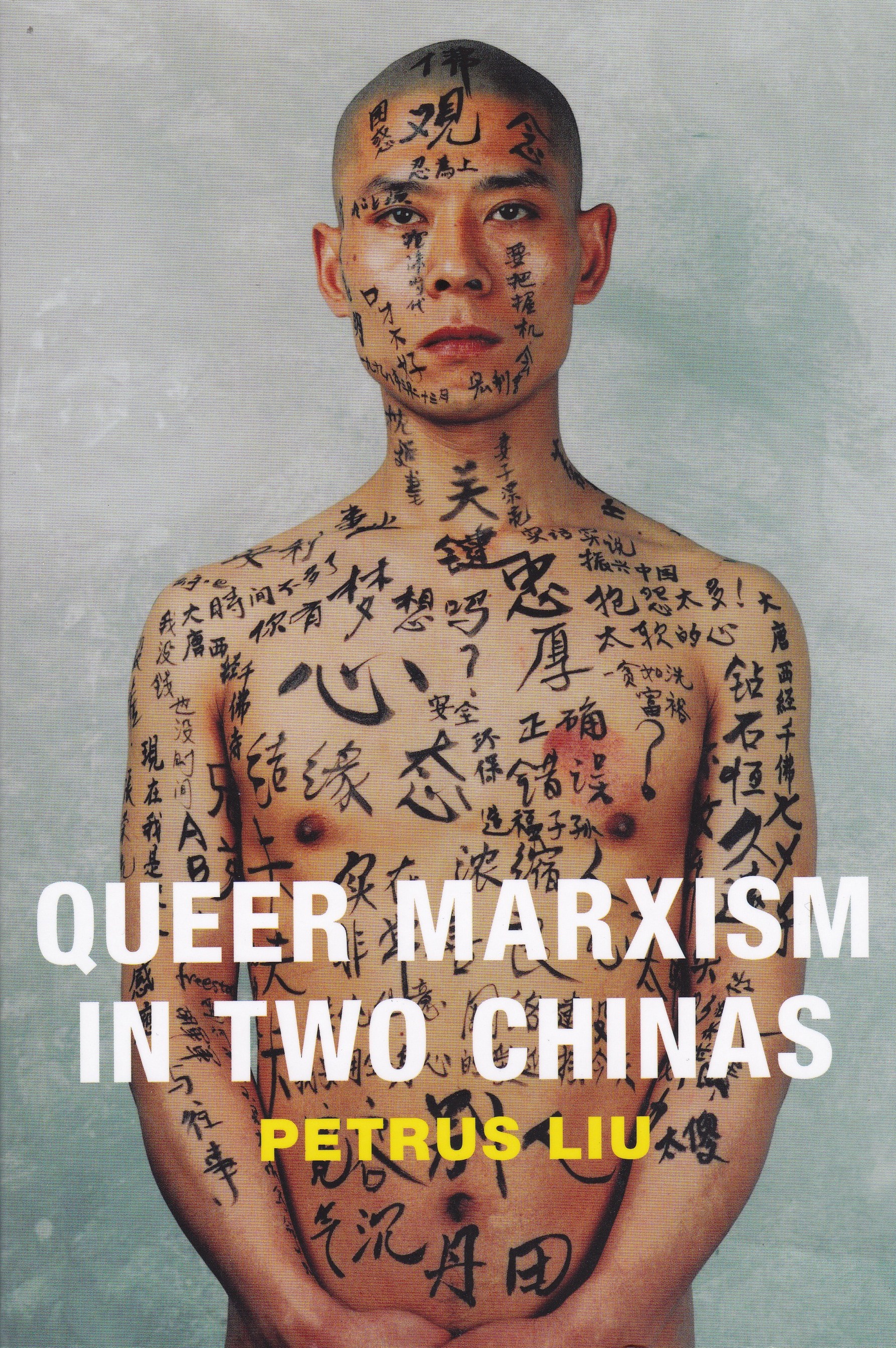 The cover of Queer Marxism in Two Chinas. Photo credit: Duke University Press
The cover of Queer Marxism in Two Chinas. Photo credit: Duke University Press
Queer Marxism in Two Chinas ultimately is the attempt to proselytize. In writing in English, Liu’s agenda is to proselytize about so-called Chinese “Queer Marxism”, in order that western academics would come to take up this thing called “Queer Marxism” as an authentic and original contribution of Chinese intellectuals to theoretical discourse. That “Queer Marxism” can find acceptance by western academics, Liu has to convince western academics that Chinese “Queer Marxism” is something which resembles themselves and in that way worthy of support, but he also needs to add an element of the exotic to it as a sign of its authenticity as “Chinese.”
Of course, the theorists of Liu’s Chinese “Queer Marxism” are almost all Taiwanese—except that these are individuals who seem to culturally and politically identify with China. And Liu is always attempting to insist on that these are “Chinese” intellectuals.
Obviously, China sells better. Though it may be that these are individuals who do identify with China rather than Taiwan, despite being born and raised in Taiwan, in Liu’s book there is always the attempt to smooth over the wrinkles of these individuals’ backgrounds to depict them as unambiguously Chinese.
There is a strong element of market pressure to that, as for all Liu’s insistence on “Queer Marxism” as a form of anti-capitalism, it is of course “China” which sells in the present and not “Taiwan”. Note well that Liu insists on “Queer Marxism in Two Chinas”—Marxism in the singular as though there would only be a single Queer Marxism across two Chinas—not “Queer Marxisms in Two Chinas”.
From “Queer Marxism in Taiwan” to “Queer Marxism in Two Chinas”: The Trajectory of the Pro-Unification Left
THE HEART OF Petrus Liu’s book would be a preceding essay of his, “Queer Marxism in Taiwan”. Why the shift from “Taiwan” to “Two Chinas”? Despite that the Queer Marxist protagonists of Liu’s book are still largely Taiwanese, it is simply that nobody cares about Queer “Taiwanese” Marxists. As for Queer “Chinese” Marxists? Sexy.
There is some hilarity to be found in the differences between “Queer Marxism in Taiwan” and Queer Marxism in Two Chinas. For one, between the writing of the essay “Queer Marxism in Taiwan” and Queer Marxism in Two Chinas, the Sunflower Movement happened in between. And the Sunflower Movement is, surprisingly enough, awkwardly praised in the later published Queer Marxism in Two Chinas as an example of the strength of Taiwanese civil society. “Queer Marxism in Taiwan” is instead empathic upon criticizing Taiwanese identity—stuck as it is in the critique of benshengren Taiwanese nationalism dating from the Chen Shui-Bian period.
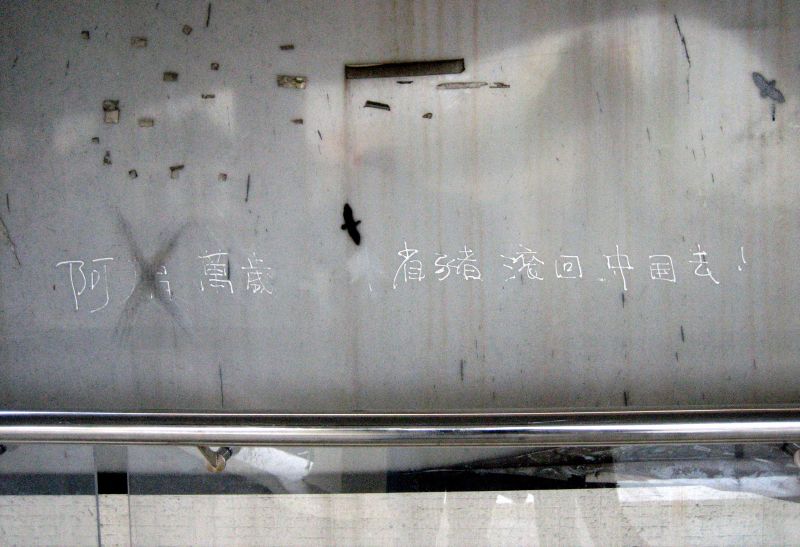 Graffiti in Daan, Taipei during Chen Shui-Bian’s presidency. The graffiti reads, “Long live Ah-Bian, waishengren pigs, go back to China!”. Photo credit: Prince Roy/Wikimedia Commons
Graffiti in Daan, Taipei during Chen Shui-Bian’s presidency. The graffiti reads, “Long live Ah-Bian, waishengren pigs, go back to China!”. Photo credit: Prince Roy/Wikimedia Commons
Because it would be that in both “Queer Marxism in Taiwan” and Queer Marxism in Two Chinas, Liu is intent on proselytizing the theoretical innovations of “Queer Marxism”. But between “Queer Marxism in Taiwan” and Queer Marxism in Two Chinas, there have been some slippages.
The protagonist theorist of “Queer Marxism in Taiwan” is Lucifer Hung, but the protagonist theorist of Queer Marxism in Two Chinas would have switched to Josephine Ho. These would be individuals who criticized the nation-building project of the Chen administration upon a benshengren identity, by way of how this nation-building project was exclusively heterosexual in nature—founded as it was upon the reproduction of the nation-state in terms of the heterosexual, nuclear family.
Yet is that in Lucifer Hung that we can particularly see the rather wretched trajectory of Liu’s “Queer Marxism.” The dead end of some of the theorists that Liu previously stumped for became quite clear in the time between the publication of “Queer Marxism in Taiwan” and the book Queer Marxism in Two Chinas as a product of their reactions to the Sunflower Movement.
Hung attracted controversy last year by labeling the Sunflower Movement as “fascist”. Hung’s invocation of “fascism” was on the basis of a claim that the Sunflower Movement was “fascistic” insofar as it aimed at the preservation of capitalism. Attempts to point to a specifically reactionary class character to the movement was where the movement was not a movement of the working class say, but broadly inflected a middle class orientation. But Hung would generally seem to have little sense of what “fascism” means either, rather jumping to the use of hyperbolic terms for shock value. Indeed, until the storm troopers and concentration camps start coming out, we had best avoid the term “fascism.”
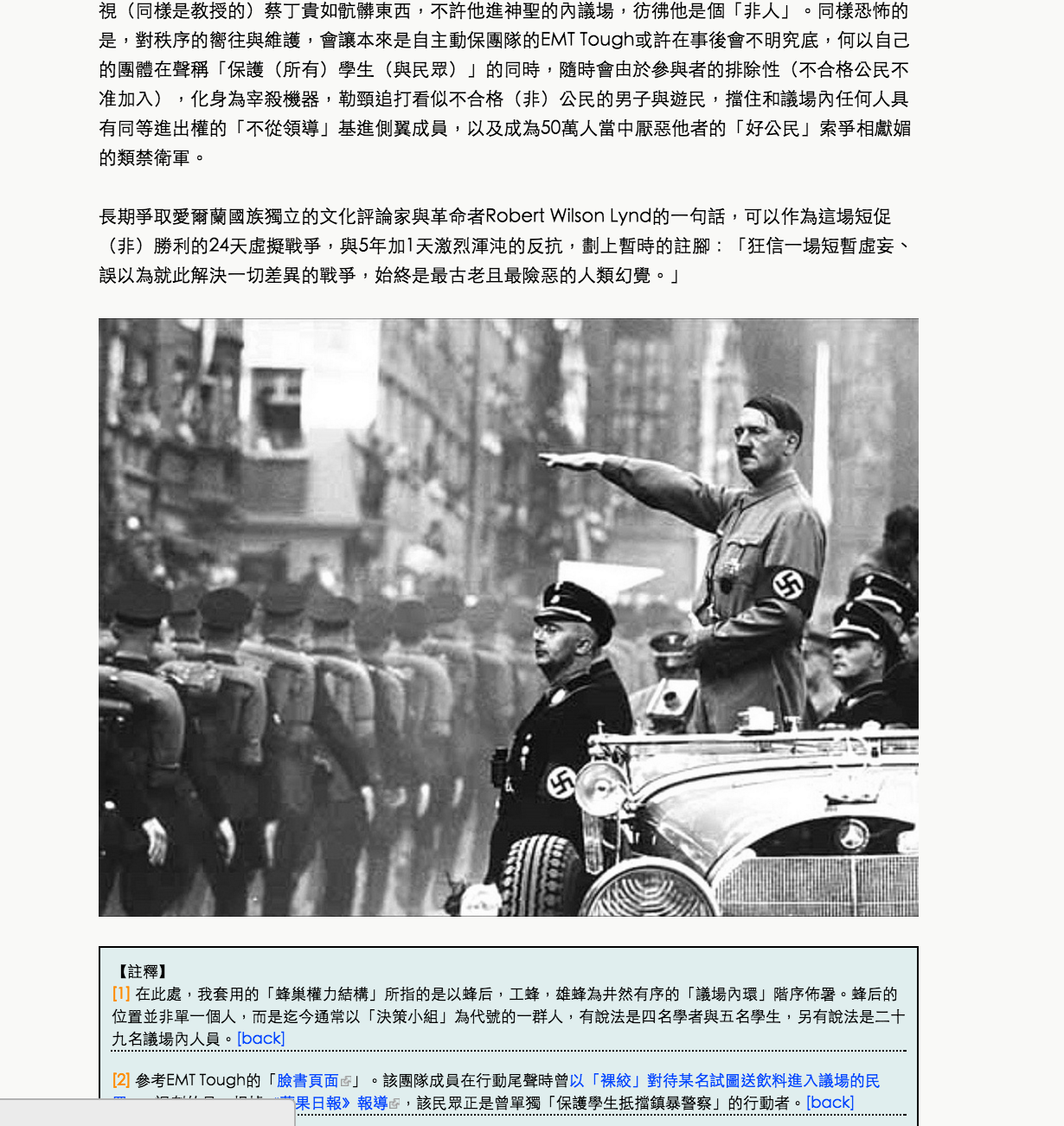 Hung’s article, published in Coolloud, even went so far as to contain a picture of Hitler
Hung’s article, published in Coolloud, even went so far as to contain a picture of Hitler
In fact, there is a rather undemocratic undertone to Hung’s fulminating against a popular movement, which was the expression of the will of the Taiwanese people. Hung’s terror of benshengren ethno-nationalism belies her true concerns, which are probably more about opposition towards any form of non-Chinese, Taiwanese identity than any claimed leftist concerns. The critique of ethno-nationalism is worthwhile, but in jumping to assumptions, Hung, of course, would probably have willfully shut her eyes to the fact that the Sunflower Movement was not about benshengren ethno-nationalism and more broadly was a reaction to KMT authoritarianism and Taiwan’s possible loss of democracy to China. More broadly, it is that Hung’s shrill invectives have led her to be taken less and less seriously in the present.
So it is that the protagonist of Queer Marxism in Two Chinas is no longer Lucifer Hung but instead Josephine Ho, who leverages the critique of benshengren nationalism in excluding migrant worker populations, queers, and high schoolers from the imagined community of the nation-state—though still for Liu she is unambiguously a “Chinese” intellectual as well. But this shift evidences backsliding on Liu’s part.
An Attempt to Proselytize for “Chinese” Queer Marxism Rather than “Taiwanese” Queer Marxism
WHEN LIU’S broader agenda is to proselytize on behalf of this intellectual clique that he terms “Queer Marxism,” such individuals are often part of the pro-unification Left who deploy the discourse of gender and sexuality in order to criticize Taiwanese identity—however, sometimes this just belies a sense of identification with China and a need to deconstruct Taiwanese identification in order to shore up this sense of identification with China.
Of course it is that Liu, in his attempt to sell this intellectual clique to the western public, much insist unequivocally that these are Chinese queer Marxists, not Taiwanese. What is avoided altogether is that this is not merely a question of these individuals’ self-proclaimed identification; the substantive socio-historic divergence of Taiwan and China makes their proclamation of being “Chinese” queer Marxists to be suspect. Though many labor under the delusion that 1949 is the split between Taiwan and China, the Taiwanese and Chinese historical experience have diverged since 1895, well over a century. And even if one goes by the date of 1949, that is still close to seventy years difference.
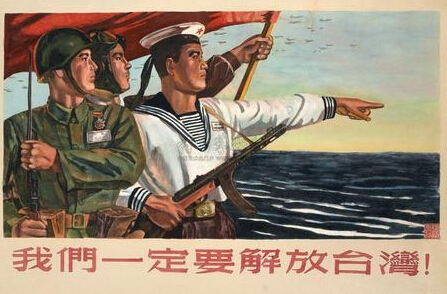 Chinese propaganda poster
Chinese propaganda poster
How really “Chinese” can the experience of Liu, Hung, or whoever be exactly without living in an environment which went through the Cultural Revolution, Great Leap Forward, the universalization of work place assignments, the formation of the hukou system, and such, quintessential parts of the Chinese but not the Taiwanese experience? If they claim to be unambiguously Chinese, as though history were no barrier, we might ask them, what was the class background their families were assigned during the Cultural Revolution? Is their hukou registration urban or rural? Do they have any siblings because their parents went against One Child Policy or no?
It is quite funny when the reaction of Chinese academics to these self-proclaimed Chinese sometimes is, “What do these Taiwanese think they know about China, anyway?” Apparently, the supra-historical essence of the cultural nation-state transcends history to make these individuals all homogeneously “Chinese” in Liu’s eyes. On the other hand, China itself is actually strangely non-present in Liu’s book when its theoretical core is not drawn from China.
If it is that Petrus Liu bases his claim to be Chinese on the basis of some kind of cultural, pan-ethnic “Chineseness,” rather than where one is born or raised, this is ahistorical in nature—and would still be an attempt to smooth over the gaps of is questionably Chinese to claim that it is, in fact, quintessentially Chinese. We see a similar attempt with Joyce Liu’s recently proposed notion to embrace the “concept of China”, which may not necessarily be geographic China, but is a abstract notion of China which persist through history.
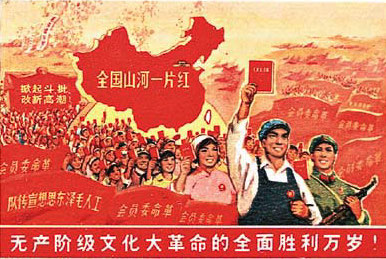 Chinese propaganda poster
Chinese propaganda poster
Of course, there is no such thing as a abstract essence of a nation-state which exists outside of history except within the claims of nationalist ideology. In such a case, one might as well speak of an amorphous “5,000 years of Chinese history” or “descendants of the Yellow Emperor”, for example. A cultural, pan-ethnic “Chineseness” is only asserted in order to subsume what is questionably Chinese into a rubric of homogeneous Chineseness, as part and parcel of a form of Chinese nationalism.
But if there is also an element of market pressure which leads to the claim of Chineseness on Liu’s part, this is because that is what sells. And this is a form of self-Orientalizing.
Western Academia’s Search for the Self in the Other
WESTERN ACADEMIA which concerns itself with Asia, despite loudly disavowing Orientalism, all too often still fails to avoid the trap of Orientalism. In the quest for something which is culturally authentic, it is that western academics are quite often actually looking for something which is different enough to be exotic, but similar enough to themselves as to be recognized as partaking of a common enterprise.
We may broadly suggest that western academia is altogether too eager in its search for equivalents to itself in non-western contexts. As a result, western academia ends up endorsing and legitimizing politically questionable intellectual groupings on the basis of a perceived sense of similarity—and often failing to realize the nationalist underpinnings of such groupings. The New Left in China would be one such example, with the uncritical support of much of the western Left—only that many individuals have still not realized that after the “nationalist turn” of the New Left, elements of the Chinese New Left has drifted into the territory of becoming apologists for the Chinese state under Xi Jinping.
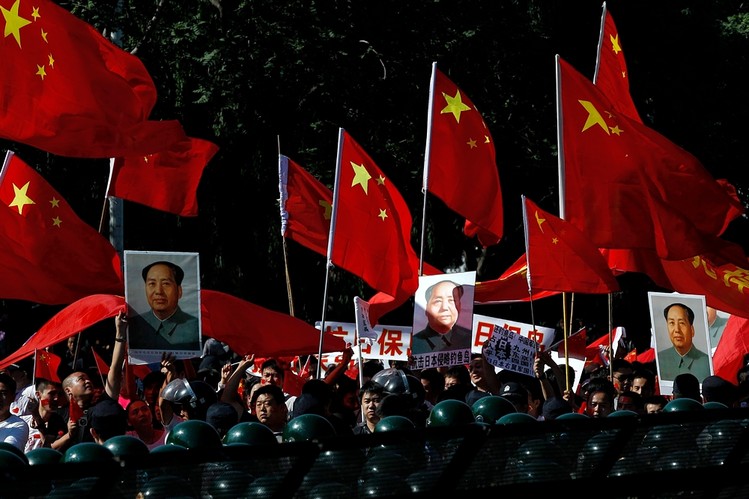 Anti-Japanese demonstrators in Beijing in September 2012. Photo credit: AP
Anti-Japanese demonstrators in Beijing in September 2012. Photo credit: AP
But it is generally a tendency to for intellectual groupings to be taken up outside of their country of origin, even when they are in decline in their native place. So-called “French Theory”, after all, was on the decline in France, as we see in the rise of New Philosophy after the decline of post-structuralist theory in France. As a result, major “French Theory” academics moved to the US, only for “French Theory” to catch on the US, become transformed as a result of the particularities of the US, and then be re-imported into France after its transformation. We still see this at present, too, in the Asian context; arguably many major Asian intellectuals were not famous in their native places of origin until they began to be translated by western academics into English. Such are the dynamics of global power with regard to international prestige.
With “Queer Marxism,” Petrus Liu is also attempting to sell as new something which has already long since expired in its place of origin. But if it is that Liu’s book is one of the major attempts to sell this intellectual clique to western academics, it is that Liu’s book is actually not particularly new or original.
Actually, the book is sometimes old hat. The book strikes almost as though it were a book which could have been written ten or fifteen years ago in Taiwan. Do we really need yet another reading of Kenneth Pai’s Crystal Boys, for example? And if it that Qiu Miaojin’s Notes of a Crocodile is another literary point of reference in the text, Liu is forever attempting to avoid the fact that Qiu’s view of Taiwanese identity as hybridized in nature are not the same as that of Chu Tianwen or another similar writer’s longing for the Chinese homeland. Although for western academics whose focus in on China and not Taiwan, a lot of what appears in Queer Marxism in Two Chinas must be new material. But this is all quite old for Taiwanese queer literature—except that, again, Liu is forever emphatic that these are Chinese texts and avoids the fact that they were Taiwanese. Sinophone, maybe, but hardly as quintessentially and unambiguously Chinese as Liu would like to claim.
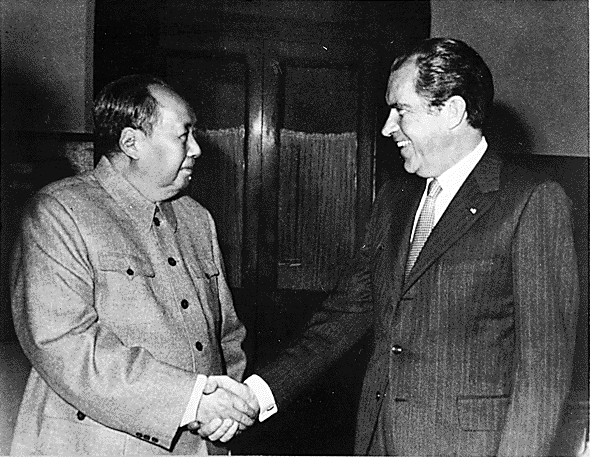 Mao meeting Richard Nixon in 1972
Mao meeting Richard Nixon in 1972
Liu seems also to be caught in rather old paradigms, in which he is still insistent upon the need to Taiwan and China’s cross-strait relations within context of the Cold War. And as with much of the pro-unification Left clique that Liu hails from, forever raising the specter of the Cold War quite often actually belies lack of knowledge about the Cold War. Oftentimes, this also belies an inability to theorize any history after the Cold War.
For example, it is not that Eastern nations were praised for overcoming Asian barbarity through the rise of Asian capitalisms, in overcoming “Oriental despotism” to become something like western capitalist states. Rather, Asian nations were precisely praised by Cold War demagogues as Henry Kissinger and others for synthesizing indigenous Asian cultural traditions—such as Lee Kuan-Yew’s “Asian values”—with western capitalism. It may be that Liu avoids the question because this is uncomfortably close to Liu’s own position. Although Liu’s attempt to prove the sophistication of “Queer Marxism” as no less than that of any western theory also would seem to belie his own desire to prove that Asia has overcome Asian barbarity, in regards to the poverty of theory, and can produce theory on par with the West.
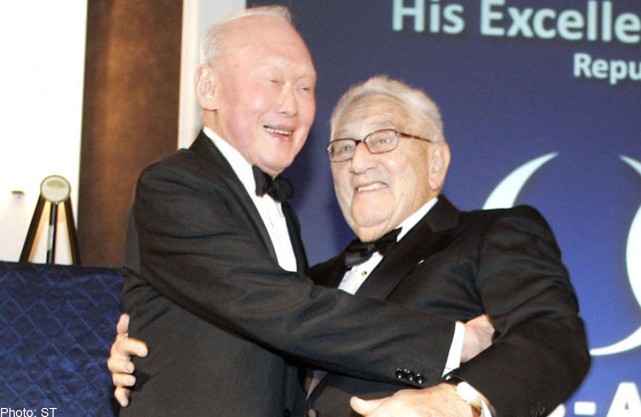 Lee Kuan Yew and Henry Kissinger. Photo credit: Straits Times
Lee Kuan Yew and Henry Kissinger. Photo credit: Straits Times
Namely, Liu attempts to claim that Queer Marxism is authentically non-western but also measures up to any western standard is always undermined by attempting to evade the question of that “Queer Marxism” is obviously a product of queer theory and Marxist discourse imported from the West. So, too, with the Chinese “New Left” and similar formations. We might also note the generally shallow engagement with Marxism on Liu’s part, in which Marxism seems to mean very little other than vague class analysis.
Today, we see various attempts to export Asian capitalisms to western contexts in order to reinvigorate failing western capitalism. This, too, vaguely seems to be the logic undergirding Liu’s attempt to sell “Queer Marxism.” Now an ideology from the periphery tries to sell itself back to the center, depicting itself as exotically different, but not dissimilar enough as to be totally alien.
When the Pro-Unification Left Tries to Proselytize Abroad?
TO BE SURE, western academics in the area studies are, as a rule of thumb, not very good at picking up on intellectual shifts which occur in the place of their study. Rather, there tends to be a lag of several years before western academics pick up on an intellectual shift. We see this at present most vividly, perhaps, with the near total lack of awareness of western academia of the Chinese New Left’s “nationalist turn.” Figures as Wang Hui are hardly some kind of intellectual dissident against Chinese state capitalism in the present, but a figure deeply ensconced in the status quo—whether willing or not—with his present nickname in China of “professor of the nation” (國師) and statements which can be read as apologia for Chinese imperialism.
This is sometimes a product of shoddy language skills or being at a remove from local discourse, other times a sign that western academics are more interested in finding mirror reflections of themselves than actually studying the place they claim to specialize in—or hardly dare to be critical of intellectual discourse in the place which serves as the object of their inquiry. Rather, they merely hope to latch onto something which is authentic enough as a “indigenous” or “native” phenomenon, but with enough resemblance to themselves to project themselves onto. Perhaps such self-consciousness is beyond to be hoped for. Thus, when an intellectual phenomenon which is long dead, long expired and rotten in its place of origin becomes popular elsewhere, quite often this is when western academics come to act as missionaries.
Regardless of any critique of Petrus Liu’s Queer Marxism in Two Chinas, probably it will be that the book is taken up by western, left-leaning academics to the degree that it caters to their projections. Maybe it will win over such missionaries. That is not surprising, although it would be disappointing. But maybe one should not expect so much.


 The cover of Queer Marxism in Two Chinas.
The cover of Queer Marxism in Two Chinas.  Graffiti in Daan, Taipei during Chen Shui-Bian’s presidency. The graffiti reads, “Long live Ah-Bian, waishengren pigs, go back to China!”. Photo credit: Prince Roy/Wikimedia Commons
Graffiti in Daan, Taipei during Chen Shui-Bian’s presidency. The graffiti reads, “Long live Ah-Bian, waishengren pigs, go back to China!”. Photo credit: Prince Roy/Wikimedia Commons Hung’s article, published in Coolloud, even went so far as to contain a picture of Hitler
Hung’s article, published in Coolloud, even went so far as to contain a picture of Hitler Chinese propaganda poster
Chinese propaganda poster Chinese propaganda poster
Chinese propaganda poster Anti-Japanese demonstrators in Beijing in September 2012. Photo credit: AP
Anti-Japanese demonstrators in Beijing in September 2012. Photo credit: AP Mao meeting Richard Nixon in 1972
Mao meeting Richard Nixon in 1972 Lee Kuan Yew and Henry Kissinger. Photo credit: Straits Times
Lee Kuan Yew and Henry Kissinger. Photo credit: Straits Times